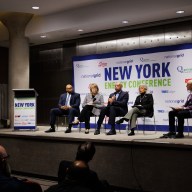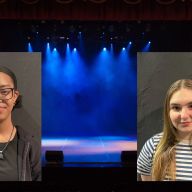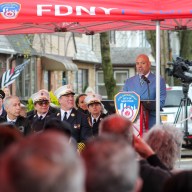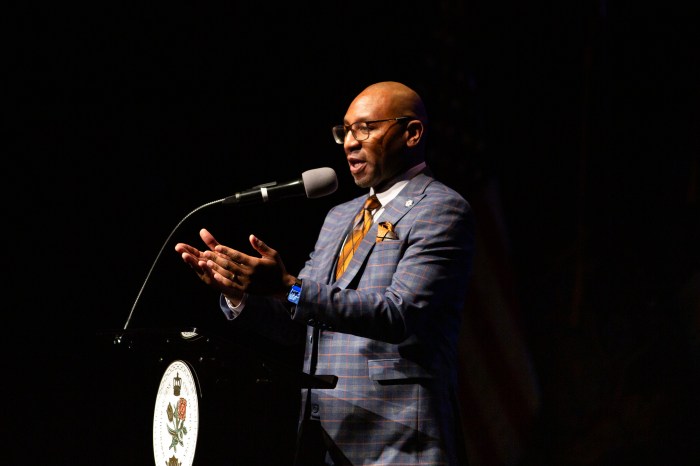By Kenneth Kowald
I learned a good deal about government and many other things when I held an appointed position in the then new New York City Department of Air Pollution Control. The commissioner was Leonard Greenburg, a medical doctor and a Ph.D. in engineering. The deputy commissioner was Sylvan Hanauer, a brilliant civil engineer and good government activist.
At the time, I was the editor of the Queens Post, a weekly newspaper whose offices were on Austin Street in Forest Hills and was very much oriented to the Forest Hills area and nearby neighborhoods.
I had also become active in politicis. In those days, I think we spent less time worrying about conflict of interest, but if my memory does not fail me, all political parties felt The Queens Post dealt fairly with them. At the paper we tried to serve our constituents first and foremost.
Radio personality Martha Deane had Dr. Greenburg as a guest many times. She called him her “double doctor”.
Dr. Greenburg believed in the Common Law. He said, more than once, something along these lines: “If we get a complaint about an employee’s attitude to the public, we’ll handle it in house. If we get a complaint about slowness of action by an employee on a matter, we’ll handle it in house. But if we get a complaint which would need to be investigated further, should there be a violation of the law, we will not touch it in house. It will go directly and quickly to the city Department of Investigations, which handles these matters.”
We did that. I can’t remember if there were many or any cases which went to DI, but everyone on staff knew that was the way things would be handled.
We had no scandals. The matter would be out of our hands and in the hands of those who were paid to do the job.
How different it was in Brooklyn among the Ultra-Orthodox (the ones who helped elect U.S. Rep. Bob Turner in that recent special election) for many years, until very recently. They had the Brooklyn district attorney on their side as the Common Law was evaded, time and again.
Their surprise support of Turner brought them into the spotlight of public attention. As a result, the evasions of the law are no longer a closely held, dirty little secret in that community.
I will continue to refer to these Ultra-Orthodox people as U-Os. No offense intended. It’s a matter of saving space.
As I have been gathering information about child abuse — not just among the U-Os, as I hope to make clear — one long article, with photographs, published on May 21,2012, came to mind first. It is about a rally of perhaps 60,000 U-Os, men only, gathering at Citi Field and Arthur Ashe Stadium, to hear about the risks of the Internet. One of the three photographs showed some protesters — including women — holding signs that read “The Internet is Not the Problem.”
The protesters told the press they shared the religious belief of the attendees, but wanted to show support for the victims of child abuse, some of whom, they said, had been discouraged in the U-O communities from calling the police. Some who complained had been shunned or threatened after they reported the crimes that had been committed against them.
Unfortunately, across this nation and across the world institutions of various kinds believe that they can deal with this terrible problem in-house.
Remember Penn State University? Here was an institution of some academic value, if one can judge from the reports, which allowed the sports part of its life to dominate to a degree where it seemed no one involved in this multimillion-dollar industry could be touched by scandal. Any such problems would be handled in-house, to protect the sports business and the university.
It didn’t work. When the reports about sexual abuse of minors by a sports leader became public, it was clear that “cover-up” would be the first word to come to mind to any sentient human being. When we begin to avoid dealing with the facts, we place ourselves in positions of hypocrisy. That is what happened at Penn State and maybe even the governor of the state might agree with that analysis.
The Penn State horror has opened the door to another problem we have. Sport is no longer a competition only. It is now big business. You don’t build a stadium for 100,000 fans and not want to fill it, right? It brings in big money. It helps with academic life, right? That’s what Penn State did.
But is that the purpose of sport in a university? Is that the purpose of sport in any school?
This attitude has permitted a niche in the culture which seems ready to forgive anything sports stars do, as long as they bring in the bucks. Small cities and towns which have suffered financially are willing to cheer for athletic success, even when the athletes turn to rape and violence. Their “star power” seems to be able to give them a free pass to do as they please.
You can read or hear about this any day of the week, in any form of the media.
Scandals in sports are given short shrift in most media, especially TV news, where the sports coverage is, at best, incestuous. So, this star was DUI. So what? He plays a great game and draws the crowds. And boys will be boys! We’re happy to have him back, right?
That’s bad enough in “professional” sports, where big bucks equal big forgiveness.
To make it part of academic life, where sport should be a part of learning–not earning–is despicable.
The point to remember in all of this — religious, secular, non-profit, profit, academia — is that possible crimes should not be judged by those who know about the crimes. They should be reported promptly and fully to the legal authorities, who will make the decisions about the problems. And they should do so without fear or favor and certainly not with politics in mind.
Henry II and Thomas Becket debated about that centuries ago. Thomas was murdered and became a saint. But, the Common Law is Henry’s victory and, indeed, it is a victory for all those who want to live under the rule of law that applies to all of us.
It’s simple: As the phrase goes, “If you see something, say something.”
But, it goes further than that. If you suspect something, hear something or know something that may be criminal, say something.
That goes for more than child abuse, let’s remember.
That’s as true in prep schools in Riverdale and Brooklyn, as it is in Queens, as it is in Steubenville, or Rome or Williamsburg or State College or Deerfield or Rutgers or Torrington. We seem to add to the list far too frequently.
That’s true in countries where children are turned into soldiers. That’s true in countries where girls seeking education are the targets of death squads.
No group or country should be exempt from the laws against child abuse, fraud and other crimes.
Ever.





























